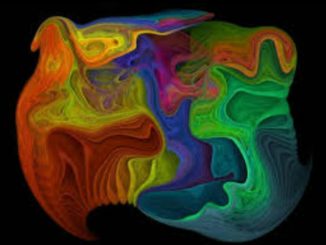
Conversations across time: Aamir Khan Aamir’s dialogue with literary tradition
by, Bilal Mukhtar (Australia)
The latest collection of poems, “Dard Muskuratay Hain”, by Aamir Khan Aamir, a young poet from Hazara, lies before me.
As I turn the first page, a few questions begin to surface in my mind: do pain truly smiles, or is there something hidden behind these seemingly smiling visages, something concealed by a mask of mirth? Or has pain become a source of pleasure, a cause for joy in its very presence?
I embark on this literary journey to explore these very questions.
The Nobel laureate T.S. Eliot, in his poignant style, writes:
For I have known them all already, known them all: Have known the evenings, mornings, afternoons, I have measured out my life with coffee spoons; I know the voices dying with a dying fall Beneath the music from a farther room. So how should I presume?
(The Love Song of J. Alfred Prufrock, 1915)
Eliot masterfully captures the essence of a meaningless, mundane, and routine existence. Aamir Khan Aamir’s poetry resonates with this sentiment, interlinking with it in a profound way:
The preacher’s words only amplify the longing of the living, Your fiery rhetoric brings complaints from the people. He who poisons the sweetness of emotions,
Aamir laments such bitter pronouncements.
Comparing Eliot and Aamir reveals the intricate nature of human communication. Even simple sentences, laden with the bitterness of tone, can inflict wounds. Much like Eliot’s assertion of measuring his life with coffee spoons—a satirical expression on the purpose of life—Aamir seems repulsed by venomous expressions.
He describes the eve of Eid (chand raat) with exceptional beauty:
How beautiful is this act of nature, How beautiful is this creation of Chand Raat. Step out and witness with your own being, How beautiful is the very essence of fragrance.
(Page 35)
Samuel Beckett, in his iconic play, wrote about the emptiness of life:“
Nothing happens. Nobody comes, nobody goes. It’s awful.
(Waiting for Godot, 1952)
In his search for meaning within the meaningless, Aamir pens an intriguing poem. He manages to find some semblance of meaning in life, yet a sense of incompleteness persists, like a half-filled glass. Where can the emptiness of the remaining half be found?
The reasons of the world are incomplete,
I have witnessed incomplete dreams.
Lest your memory carry away,
Incomplete are the floods of your eyes.
Incomplete is the smile of the lips,
Incomplete is the recognition of loved ones. … Incomplete is the evening,
Incomplete is the night,
Incomplete is the gift of stars.
Keep half your face near,
What is the point of a partial existence?
(“Adhoora Pan” (Incompleteness), Pp 38-39)
Aamir Khan Aamir brings forth an important philosophical thought: how we feel when we begin to know more. The famous Roman writer Publilius Syrus once said: “In knowing nothing, life is most delightful.”
Similarly, Thomas Gray wrote in one of his poems: “Where ignorance is bliss, ‘Tis folly to be wise.” (Ode on a Distant Prospect of Eton College)
We encounter many people who seem troubled by an excess of knowledge or awareness. Aamir Khan Aamir hints at something similar:
Love is a destroyer of homes, O Lord,
Awareness is a torment, O Lord.
May blood drip from the eyes of madness,
Wisdom is like a curse, O Lord.
(Page 27)
Turning the pages, one encounters a distinct musicality. Consider this simply expressed poem:
The heart’s desire is like a dream,
Like a continuous torment.
Such an atmosphere of pervasive fragrance,
And a demeanor like a rose.
Honey scattered upon the lips,
The eyes like rising wine.
Everyone has their own troubles,
Everyone has their own reckoning.
He is so beside himself,
Like a self-willed nobleman.
(Page 29)
If we decipher the personal allusions in the poet’s work, we find instances of rebellion, the courage to question, and a desire for clarity. For example:
Whatever you have to say, say it openly to us, We will not understand ambiguous questions. Even when we understood, we suffered losses, Now we have understood that we will not understand anything. (Page 46)
On one hand, Munir Niazi says:
The stars that twinkle In someone’s wondering eyes
The meetings that take place In the beauty of clouds and rain
These will happen in desolate times
In a saddened heart Love will not happen now
It will happen after some days
When these days have passed
It will be in their memory
In response to “Love will not happen,” Aamir Khan Aamir creates “Nazar Munir Niazi” (A Tribute to Munir Niazi):
When the stars gleam In an unknown season
When separation torments
Someone is remembered
Upon hearing someone’s name
This hatred can also be lost
Support can also be found
Love can also happen
The technical term for this technique in literature is “intertextuality.” It’s a simple concept, described by Dr. Ashraf Kamal as:
“Using another text as a reference, while reading one text is called intertextuality.”
Comparing the two poems reveals interesting points:
a) Both poems focus on the themes of stars, meetings, and love.
b) Munir Niazi’s poem contains an element of sadness, while Aamir Khan Aamir’s poem embodies hope and new possibilities.
c) In terms of message, Munir Niazi’s poem evokes the memory of lost love, while Aamir’s poem points towards opening new doors of love.
It’s important to remember that intertextuality is not just a comparison between two literary works; it’s a study of how one work relates to, is influenced by, or alters another. In this context, Aamir’s poem can be seen as a response to Munir Niazi’s poem, presenting a different perspective on the same theme.
I have never met this poet from the Siran Valley of Mansehra, nor have I had the opportunity for a virtual conversation. However, after reading his book, I can happily say that from the storm of despair, we have heard a fresh voice. A poet of hope has emerged. Indeed, we can call him a “Poet of Optimism.”




